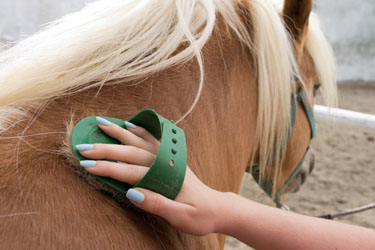Veterinarian Tips: Horse Cleaning Techniques

Most horses enjoy a good bath! Not only does it help to remove plant matter and dirt, but it also gets rid of itchy, loose hair. Using a good horse shampoo leaves the animal’s coat clean and shiny, but now and then, there are times when a horse gets into something and even the shampoo needs help!
So what do you do when your clients come calling needing advice for an exceptionally sticky-or stinky-situation? Offer them this information:
How to Deep Clean Your Horse
Tar, Oil, and Paint
On Hair
When sticky substances like tar, oil, and paint get on the coat of a horse, there is a good chance scissors will be needed.
Supplies:
- Cotton balls
- Vegetable oil
- Degreasing dish soap
- Water
- Scissors
Steps:
- Trim away as much of the sticky hair as possible without ruining the coat or taking it down to the skin, but keep in mind that the less coated the hair, the better the chance for getting the animal clean.
- Using a cotton ball wet with vegetable oil, dab the sticky area until it is soaked in vegetable oil
- Do not wipe it off. Leave the vegetable oil on overnight
- In the morning, wash the vegetable oil off with dish soap and water
- If there is any residue, repeat.
On a Hoof:
Supplies:
- Cotton balls
- Nail polish remover
- Dish soap
- Water
Steps:
- Dab the cotton ball in the nail polish remover
- Wipe the area of the hoof that is sticky
- Repeat until the hoof is clean
- Wash the hoof with dish soap; rinse.
CAUTION: Never use the following petroleum solvents on a horse; they can be harmful to the animal’s skin and hooves:
- Gasoline
- Kerosene
- Turpentine.
Skunk Spray
Slow-walking skunks traveling across a pasture seem to attract the attention of horses. Getting sprayed is bad enough, but cleaning the skunk oil off a horse can be awful, too! While there are many types of commercial skunk odor removal products available for purchase, the following common household ingredients will work in a pinch! Just make sure to read the list of cautions before mixing.
Supplies: This is the basic ratio of ingredients to water. Depending on how big of an area needs washed, an additional batch may need to be prepared:
- 1 pint of hydrogen peroxide
- ¼ cup baking soda
- 2 teaspoons of degreasing dish soap
- 1 gallon water.
CAUTION: While this formula is safe for use with horses, pets, and people, keep in mind:
- Keep the ingredients in their own separate containers while being stored
- Do not mix the items together until they are needed
- Do not mix and then store these ingredients in a covered container. It will explode!
- Once mixed together, use within one hour
- Wear safety goggles to protect your eyes and rubber gloves to protect your hands
- Do not get the solution in the horse’s eyes
- Solution may bleach the animal’s coat slightly.
Steps:
- Before mixing any ingredients together, check the animal’s eyes, if they look irritated or red, immediately flush them carefully with clean, cool water
- Lightly mist the animal with water, and look for a slight sheen, these are the areas with the skunk oil that need washed
- Mix the ingredients together
- Rub the mixture through a section of the horse’s coat, then rinse the cleaned section thoroughly before moving on to the next area
- Repeat for any areas where the skunk scent lingers until animal no longer smells
- Wash the horse with its regular shampoo.
Additional Client Information
Providing helpful information to clients is a sure-fire way keep them coming back.
Below are additional articles your clients may appreciate:
Equine West Nile Virus Threat Remains
Equine Client Information: How Vaccinations Fail
Veterinarian Tips to Clear a Horse Barn of Flies
Your Covetrus representative can provide other tips and suggestions of value to you and your clients! Contact us at: 855.724.3461 or online.
Horse Owner’s Veterinary Handbook, 3rd ed., by T. Gore, P. Gore, J.M. Giffin
Need Regulatory Assistance
If you need help with regulatory or licensing issues, we're happy to help. We have a wide variety of resources to help you when issues arise.

Careers
Are you looking for a place to let your talents shine? At Covetrus, we help our practitioner customers better serve their patients and take pride in providing the best customer experience possible. Search our open positions to see our available opportunities.
Newsletter
Stay current with what’s going on with Covetrus, subscribe to receive our newsletter and email communications. Subscribers will receive the latest information in practice management, sales and marketing, animal health, and more.


Leave a comment